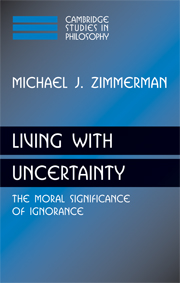2 - Risk and rights
Published online by Cambridge University Press: 22 September 2009
Summary
In chapter 1, I compared and contrasted three accounts of the general conditions of overall moral obligation. The most recent formulations of these accounts are as follows:
The Objective View (first formulation):
An agent ought to perform an act if and only if it is the best option that he (or she) has.
The Subjective View (first and only formulation):
An agent ought to perform an act if and only if he believes that it is the best option that he has.
The Prospective View (sixth formulation):
An agent ought to perform an act if and only if it is the prospectively best option that he has.
I noted a number of points about these formulations. First, they are all very rough. Second, by an “option” I mean something that the agent can do, where “can” expresses some form of personal control. Third, the accounts may be extended to cover overall moral rightness and wrongness. Fourth, the accounts are intended to be applicable to any substantive theory of moral obligation, such as those proposed by the act–consequentialist, the rule–consequentialist, the virtue–theorist, and so on, in as much as “best” may be variously construed as “instrumentally best,” “rule–best,” “best in terms of the display of virtue,” and so forth.
I argued that we should accept the Prospective View and reject the Objective and Subjective Views.
- Type
- Chapter
- Information
- Living with UncertaintyThe Moral Significance of Ignorance, pp. 72 - 117Publisher: Cambridge University PressPrint publication year: 2008



